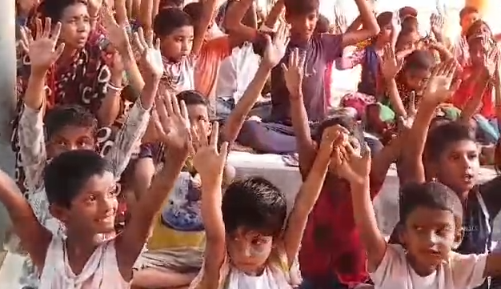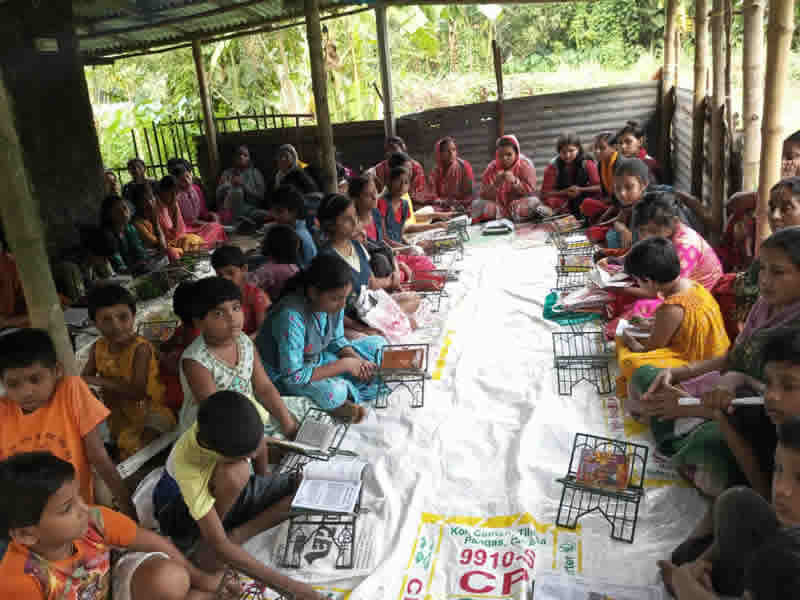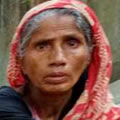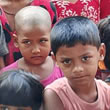Gita Principles in Bangladesh: Applying Krishna's Teachings to Daily Life
- Jeffrey Dunan
- Oct 1, 2025
- 15 min read
Updated: Nov 4, 2025
Key Takeaways
The Bhagavad Gita offers practical wisdom that transcends religious boundaries, making it accessible to people of all faiths in Bangladesh
Core principles like mindful action (Karma Yoga) and understanding one's purpose (Dharma) provide concrete solutions for modern daily challenges
Families across Bangladesh are strengthening relationships by implementing detachment and selfless love concepts from Krishna's teachings
Rural communities have seen significant positive transformations in conflict resolution and academic performance through Gita-based education programs
Simple 5-minute daily practices derived from the Gita can dramatically reduce stress and improve mental clarity in today's fast-paced world
A Rural Bangladesh Community Bhagavad Gita School
Life in Bangladesh comes with its unique challenges – from navigating busy urban centers to maintaining traditional values in rapidly changing times. Across this beautiful country, people are discovering that the ancient wisdom of Krishna, as presented in the Bhagavad Gita, offers surprisingly practical solutions for modern dilemmas. The teachings don't require converting to Hinduism or abandoning existing beliefs – instead, they provide universal principles that complement any spiritual path. Lotus Ministry has been at the forefront of sharing these transformative teachings, helping Bangladeshis apply timeless wisdom to everyday situations.
The Bhagavad Gita's enduring relevance comes from addressing the fundamental human condition rather than specific cultural contexts. When Krishna counsels the warrior Arjuna on the battlefield, he speaks to the universal experience of confusion, duty, and the search for meaning. These same challenges face Bangladeshis today – from the farmer in Rangpur to the tech professional in Dhaka.
Krishna's Wisdom: Finding Peace in Modern Bangladesh
Bangladesh's unique cultural landscape provides fertile ground for Krishna's teachings to take root. The country's deep spiritual heritage, regardless of religious affiliation, creates natural resonance with the Gita's emphasis on inner development and ethical living. Students in rural Gita-based educational programs have shown remarkable improvements in academic performance, emotional regulation, and community engagement. Parents report children becoming more respectful, diligent in studies, and thoughtful in their interactions after learning to apply even simple concepts from this ancient text.
How Gita Teachings Align with Bangladeshi Values
The core values of Bangladesh – family unity, respect for elders, community cooperation, and the pursuit of knowledge – find strong reinforcement in Krishna's teachings. The Gita's emphasis on duty (dharma) resonates deeply with Bangladesh's cultural focus on responsibility to family and community. When students learn about dharma through the Gita, they gain a framework for understanding why their daily responsibilities matter in a larger context. This alignment makes implementation natural rather than forced, as the teachings amplify existing cultural strengths rather than contradicting them.
The Universal Appeal Across Faith Traditions
One of the most remarkable aspects of Gita education in Bangladesh is how it transcends religious boundaries. Muslim families initially hesitant about the teachings quickly recognize their universal applicability. The principles of mindfulness, ethical action, and inner development complement rather than compete with Islamic values. As one mother from Chittagong explained, "These teachings helped my children become better Muslims by teaching them patience, focus, and kindness." Religious leaders across traditions have acknowledged how Krishna's wisdom reinforces the ethical foundations common to all faiths.
The practical nature of the Gita's teachings makes them accessible regardless of background. When a rural schoolteacher introduces the concept of mindful action without attachment to results (Karma Yoga), students grasp its immediate relevance to their studies, family responsibilities, and personal challenges. They see how focusing on the quality of their efforts rather than worrying about outcomes reduces anxiety and improves performance – a principle that works regardless of one's religious beliefs.
Core Gita Principles That Transform Daily Life
At the heart of Krishna's teachings lie several transformative principles that provide practical guidance for daily living. These are not abstract philosophical concepts but actionable insights that anyone can apply. In Bangladesh, students and adults alike have found that understanding and implementing these principles creates profound changes in their approach to life's challenges and opportunities.
Bhakti Yoga: Devotion in Everyday Activities
Bhakti Yoga transforms ordinary actions into spiritual practice through the power of devotion and mindfulness. In Bangladesh, this principle helps people find deeper meaning in daily routines – whether preparing meals, tending crops, or caring for family members. By approaching these tasks with full attention and loving intention, mundane activities become opportunities for inner growth. A shopkeeper in Khulna shared how applying this principle changed his business: "When I started treating each customer interaction as sacred, not only did my satisfaction increase, but my business actually improved as customers responded to the genuine care."
Jnana Yoga: Self-Knowledge for Inner Peace
Jnana Yoga, the path of knowledge, helps Bangladeshis distinguish between the permanent and impermanent aspects of life. This wisdom becomes particularly valuable during times of rapid social change. By understanding the difference between their eternal self and temporary circumstances, people develop resilience against life's inevitable ups and downs. A university student in Dhaka explained, "Learning about self-knowledge from the Gita helped me stop identifying with my exam results and focus instead on my growth as a person. This perspective reduced my anxiety significantly."
Dharma: Understanding Your True Purpose
The concept of dharma or righteous duty provides a framework for ethical decision-making that transcends situational ethics. In Bangladesh's competitive job market and changing social landscape, understanding one's dharma helps people make choices aligned with their deepest values rather than simply following trends or pursuing short-term gains. Teachers report that when children understand dharma, they develop stronger intrinsic motivation for studying and helping others, rather than acting only from fear of punishment or desire for reward. For more insights, you can explore how to practice Bhagavad Gita teachings in daily life.
Karma Yoga: Selfless Action Without Attachment
Perhaps the most practically applicable teaching for daily life in Bangladesh is Karma Yoga – performing necessary actions with full effort but without attachment to their fruits. This principle has revolutionized how students approach exams, farmers view crop outcomes, and business people handle market fluctuations. By focusing on excellent action rather than worrying about results, people experience less anxiety and paradoxically achieve better outcomes. A farmer from Sylhet shared, "Since learning about Karma Yoga, I work diligently but don't despair when weather damages crops. This mental freedom has actually made me more innovative in finding solutions."
Work and Career Success Through Gita Principles
In Bangladesh's evolving economy, workplace stress and ethical dilemmas present significant challenges. Krishna's teachings offer remarkably relevant guidance for navigating professional life with both success and integrity. Those who apply Gita principles in their careers report not only greater achievement but also deeper satisfaction and improved relationships with colleagues.
Workers across industries—from garment factories to IT firms—find that the Gita's emphasis on disciplined action, ethical conduct, and emotional regulation provides a competitive advantage in today's complex professional landscape. Unlike conventional career advice that focuses solely on external success, Krishna's wisdom integrates professional achievement with personal wellbeing and spiritual growth.

Enthusiastic Children Finding Meaning In Life
Finding Meaning in Your Daily Work
The Gita transforms mundane work into meaningful service through its concept of yajna (sacred offering). Bangladeshi professionals applying this principle report profound shifts in job satisfaction regardless of their position. A bank teller in Rajshahi described how this perspective changed her outlook: "I used to resent the repetitive tasks, but now I see each transaction as an opportunity to serve others with excellence. My days feel purposeful rather than draining, and customers notice the difference in my attitude."
Making Ethical Decisions in Business
Krishna's emphasis on satya (truthfulness) and ahimsa (non-harming) provides clear guidance for ethical business practices. In Bangladesh's business environment where corruption sometimes seems expedient, these principles help entrepreneurs and managers maintain integrity without sacrificing success. Business owners report that prioritizing ethical practices actually improves long-term profitability through enhanced reputation, employee loyalty, and customer trust—proving that dharmic business is ultimately good business.
Balancing Ambition with Inner Peace
The concept of nishkama karma (desireless action) offers a solution to the modern dilemma of burnout and work obsession. Young professionals in Bangladesh's competitive urban centers have found that pursuing excellence without attachment to outcomes enables them to work diligently while maintaining mental health. This balance proves especially valuable during career setbacks, as the focus on action rather than results provides resilience against disappointment and maintains consistent performance regardless of external conditions.
Leading Others with Wisdom and Compassion
Krishna's model of leadership as demonstrated to Arjuna offers Bangladeshi managers a template for compassionate yet decisive guidance. Leaders who incorporate Gita principles create work environments characterized by mutual respect, clear purpose, and shared commitment. A factory supervisor in Chittagong credited these teachings with transforming his management style: "I used to lead through fear, but now I inspire through understanding each worker's potential and purpose. Productivity has increased while conflicts have decreased dramatically."
Overcoming Life's Challenges the Gita Way
Life in Bangladesh presents unique challenges—from natural disasters to economic uncertainties. The Gita offers practical wisdom for facing adversity with resilience and grace. Unlike superficial positivity, Krishna's approach acknowledges difficulties while providing tools for transcending them.
The text's recognition that suffering is inevitable but suffering is optional provides Bangladeshis with psychological resources for navigating hardship. This perspective has proven especially valuable during floods, cyclones, and other natural disasters that regularly affect the country.
Develop equanimity through regular meditation practice
Recognize impermanence to reduce attachment to outcomes
Practice karma yoga by focusing on helpful actions rather than worrying
Build community support through selfless service during crisis
Maintain routine spiritual practices even during emergency situations
Families that implement these principles consistently report greater collective resilience and faster recovery from setbacks. The focus on what can be controlled—one's own actions and attitudes—proves especially empowering during circumstances where external factors seem overwhelming.
Dealing with Loss and Grief
The Gita's teachings on the eternal nature of the soul offer profound comfort during times of loss. When Krishna explains to Arjuna that "the soul neither kills nor is killed," he provides a perspective that helps transcend the immediate pain of loss while honoring genuine emotions. Families in Bangladesh who have experienced bereavement report that this understanding doesn't eliminate grief but transforms it into a more peaceful acceptance. One mother from Sylhet shared, "After losing my husband, Krishna's teachings helped me understand that while I miss his physical presence, our connection continues on a deeper level. This perspective gave me strength to continue caring for our children."
Finding Strength During Financial Hardship
Economic challenges are common in Bangladesh, particularly in rural areas and during natural disasters. The Gita's wisdom on detachment from possessions while maintaining diligent action offers a balanced approach to material struggles. Rather than promoting either resignation or anxiety, Krishna's teachings encourage resourcefulness combined with inner contentment. Families practicing these principles report greater resilience during financial setbacks, maintaining household harmony even when resources are limited. A father from Rangpur explained, "When crop failures threatened our income, remembering Krishna's teachings about focusing on duty rather than results helped me stay calm and find alternative solutions instead of falling into despair."
Maintaining Mental Health Through Spiritual Practice
The rising incidence of anxiety, depression, and stress-related conditions in Bangladesh responds remarkably well to the Gita's time-tested practices for mental wellbeing. Krishna's emphasis on controlling the mind through meditation, right understanding, and disciplined action provides effective tools for mental health maintenance. Doctors in Bangladesh have begun recommending these practices as complementary approaches alongside conventional treatment. Research from local universities confirms significant improvements in mental health indicators among participants in Gita-based wellness programs, including reduced anxiety symptoms and improved sleep quality.
Simple Daily Practices From the Gita
The practical power of Krishna's teachings emerges through consistent daily application. Across Bangladesh, people are integrating simple Gita-inspired practices into their routines with remarkable results. These practices require minimal time yet yield significant benefits for mental clarity, emotional regulation, and spiritual connection. The beauty of these approaches lies in their accessibility—requiring no special equipment, minimal time, and adapting easily to busy modern lifestyles.
5-Minute Morning Meditation Techniques
Starting the day with even five minutes of focused meditation creates a foundation of clarity that benefits all subsequent activities. Based on Krishna's instructions for controlling the mind, these simple morning practices help Bangladeshis establish mental stability before engaging with daily challenges. One popular technique involves sitting quietly while focusing on natural breath, then silently repeating a meaningful phrase from the Gita such as "I am not this body, I am spirit" or simply "peace." Students who practice this brief morning meditation report improved concentration in classes, while professionals note enhanced decision-making and reduced reactivity to workplace stress.
Mindful Eating as Spiritual Practice
Krishna's teachings on offering food before consumption transforms ordinary meals into spiritual nourishment. Bangladeshi families implementing mindful eating practices report improved digestion, healthier food choices, and more harmonious mealtimes. The practice involves a moment of gratitude before eating, conscious awareness of the food's journey from farm to table, and eating slowly with full attention. A homemaker from Dhaka shared, "When we began treating meals as sacred moments rather than hasty necessities, not only did our digestion improve, but our family conversations became more meaningful. Now mealtime has become our favorite part of the day."
Evening Self-Reflection Questions
The Gita's emphasis on self-knowledge becomes practical through evening reflection practices that many Bangladeshis now incorporate into their bedtime routines. Taking just a few minutes to review the day through the lens of Krishna's teachings helps integrate spiritual principles into daily life. Simple questions like "Did my actions today reflect my highest values?" or "Was I able to work with dedication without attachment to results?" promote continuous growth and course-correction. Families report that this practice improves self-awareness, reduces conflict, and creates peaceful sleep patterns by closing the day with conscious awareness rather than mindless screen time.
Integrating Sacred Mantras into Your Day
The vibrations of sacred sound have transformative power, as Krishna explains when discussing the spiritual value of chanting. Bangladeshis from various backgrounds have discovered that repeating simple mantras during routine activities—whether commuting, washing dishes, or waiting in line—creates islands of peace amidst busy days. The simplest approach involves silently repeating "Om" or "Shanti" (peace) while breathing consciously during otherwise unused moments. Office workers report that this practice creates mental refreshment during stressful workdays, while students find it helps maintain focus during long study sessions. For more insights on how to practice these teachings in daily life, you can explore this guide on integrating Bhagavad Gita teachings.

A Bangladesh Community Bhagavad Gita Study Group
Community Impact: Gita Study Groups in Bangladesh
The transformation of individual lives inevitably ripples outward to affect entire communities. Across Bangladesh, informal study groups and formal educational programs centered on Krishna's teachings are creating positive social change. These gatherings transcend religious boundaries, with participants from Muslim, Hindu, Buddhist, and Christian backgrounds coming together to explore universal wisdom.
Reduced community conflicts through improved communication skills
Enhanced academic performance among student participants
Decreased domestic violence in households studying the Gita together
Improved mental health outcomes including reduced anxiety and depression
Greater resilience during community challenges like floods or economic downturns
The format of these study groups varies widely to accommodate different community needs. Some meet in formal educational settings, while others gather in homes, community centers, or even under village trees. The common element is their focus on practical application rather than theoretical discussion—participants share not just what they've learned but how they've implemented Krishna's wisdom in their daily lives.
Researchers from Dhaka University have begun documenting these community impacts, finding statistically significant improvements in social cohesion, academic performance, and mental health indicators in villages with established Gita study programs compared to similar communities without such initiatives. These findings suggest that ancient wisdom, when applied practically, offers measurable solutions to contemporary social challenges.
Rural Communities Finding Unity in Shared Wisdom
In Bangladesh's villages, where resources are often limited but community bonds remain strong, Gita study groups have become catalysts for collective advancement. Farmers gather after evening prayers to discuss practical applications of karma yoga to agricultural challenges, while women's groups apply Krishna's teachings on inner strength to their role as family anchors. These gatherings often transcend traditional social boundaries, bringing together people of different ages, education levels, and religious backgrounds in mutual learning. For more insights on how to practice Bhagavad Gita teachings in daily life, explore related articles.
A particularly inspiring model has emerged in the flood-prone regions of northern Bangladesh, where communities face regular natural disasters. Villages with established Gita study programs demonstrate remarkable resilience during these crises, organizing more effective evacuation procedures, equitably distributing limited resources, and maintaining emotional stability under pressure. As one village elder noted, "Before understanding Krishna's teachings, floods brought panic and conflict over resources. Now we face these challenges together with clear minds and compassionate hearts."
The intergenerational aspect of rural study groups creates a powerful transfer of both traditional and spiritual knowledge. Elders share life wisdom while younger members contribute contemporary applications and technological adaptations. This exchange strengthens community bonds while ensuring that ancient teachings remain relevant to current conditions.
The Path Forward: Living Krishna's Teachings Every Day
The journey of implementing Krishna's wisdom in daily Bangladeshi life continues to evolve, adapting to changing social conditions while maintaining connection to timeless principles. As more people experience the practical benefits of these teachings, spontaneous sharing creates ripple effects through families, workplaces, and communities. The most powerful testimony comes not from formal teaching but from transformed lives that demonstrate the principles in action.
The future of Gita wisdom in Bangladesh looks promising as educational institutions increasingly recognize its value for developing not just knowledge but character and resilience. Several schools have incorporated aspects of Krishna's teachings into their character education programs, while universities are conducting research on the measurable impacts of these ancient practices on modern wellbeing. As one education minister noted, "We need not just information but wisdom to meet our national challenges. These timeless teachings offer precisely the foundation of values and mental clarity our youth need to build a better Bangladesh."
Frequently Asked Questions
As interest in Krishna's teachings grows throughout Bangladesh, common questions arise about their application across different contexts. These questions reflect the thoughtful engagement of people seeking to integrate spiritual wisdom with their existing beliefs and daily responsibilities. The answers below draw from both traditional understanding and contemporary application of these timeless principles.
The beauty of Krishna's teachings lies in their adaptability to different circumstances while maintaining their essential wisdom. For those interested in understanding how to practice Bhagavad Gita teachings in daily life, the questions below represent those most frequently asked by Bangladeshis beginning their exploration of the Gita's practical wisdom.
Can Muslims benefit from Gita teachings without religious conflict?
Absolutely. Many Muslim families in Bangladesh have found that Krishna's teachings on ethical action, mental discipline, and spiritual awareness complement rather than contradict Islamic principles. The universal aspects of the Gita—such as performing duties with excellence, maintaining inner peace amid challenges, and serving others with compassion—align with values honored in Islam. As one imam in Chittagong explained, "When we look beyond the cultural packaging, we find that these teachings reinforce many of the same values taught by Prophet Muhammad (peace be upon him). Many Muslims study these principles as practical wisdom rather than religious doctrine, just as one might learn beneficial practices from any source of knowledge."
How do I explain the value of Gita principles to skeptical family members?
Focus on practical benefits rather than philosophy when introducing these concepts to skeptical relatives. Share specific examples of how principles like mindful action or emotional regulation have improved your own life in measurable ways—perhaps better sleep, improved relationships, or greater work productivity. Avoid religious terminology that might trigger resistance, instead emphasizing universal concepts like mental clarity, ethical decision-making, and stress reduction. Many initially skeptical family members become interested when they observe positive changes in their loved ones' behavior and outlook rather than through intellectual arguments.
What's the best Gita translation for Bangladeshi readers?
For Bengali speakers, Swami Prabhupada's Bengali translation with commentary provides cultural context that resonates with Bangladeshi readers. For those preferring English, Srila Prabhupada's translation offers accessible language with practical applications for modern life. Many study groups in Bangladesh use editions that include both the original text and commentary explaining real-world applications. Digital versions are increasingly popular, particularly apps that allow searching by topic to find guidance on specific life challenges. Whatever translation you choose, look for one that balances scholarly accuracy with readability and practical application.
How can I start a Gita study group in my community?
Begin simply by inviting 3-5 interested friends or neighbors to meet regularly in a comfortable, accessible location. Successful groups in Bangladesh typically start each session with a brief reading followed by discussion of practical applications in daily life. Establish clear norms that respect diverse religious backgrounds and emphasize implementation rather than philosophical debate. Many groups assign "homework" of practicing a specific principle during the week and reporting back on results. Resources for structuring meetings are available through organizations like the Lotus Ministry, which provides free study guides specifically designed for Bangladeshi contexts.
Consider partnering with existing community organizations like schools, community centers, or professional associations to reach more people. Many successful groups in Bangladesh began as lunchtime gatherings at workplaces or after-school activities for students.
Remember that consistency matters more than length—a 30-minute weekly meeting that happens regularly creates more impact than occasional longer sessions. Start with topics most relevant to your community's needs, whether stress management for professionals or conflict resolution for families.
Keep meetings accessible by using simple language rather than Sanskrit terminology
Encourage personal sharing of experiences rather than abstract discussion
Welcome participants from all religious backgrounds without pressure to adopt specific beliefs
Use locally relevant examples that connect ancient wisdom to contemporary Bangladeshi life
Incorporate brief practical exercises like breathing techniques that provide immediate benefits
Are there specific Gita teachings that help with modern stress and anxiety?
Krishna's instructions on mental discipline offer powerful tools for managing the anxiety endemic in modern Bangladesh. The practice of mindfulness—being fully present rather than dwelling on past regrets or future worries—directly addresses a primary source of contemporary stress. When Krishna advises Arjuna to "perform your duty equipoised," he provides a practical formula for maintaining balance amid life's inevitable challenges.
Specific verses like "For him who has conquered the mind, the mind is the best of friends; but for one who has failed to do so, his mind will remain the greatest enemy" (BG 6.6) offer both diagnosis and treatment for anxiety conditions. The Gita's emphasis on identifying with one's eternal nature rather than temporary circumstances creates psychological resilience particularly valuable during uncertainty.
Simple practices derived from these teachings—like conscious breathing, mental noting of thoughts without attachment to them, and regular periods of sensory withdrawal—have proven remarkably effective for anxiety management. Many mental health professionals in Bangladesh now recommend these techniques alongside conventional treatments, recognizing their evidence-based benefits for stress reduction and emotional regulation. The beauty of these approaches lies in their accessibility, requiring no special equipment and offering benefits even from brief but consistent practice.
To discover more about how Krishna's timeless wisdom can transform your daily life in Bangladesh, explore the resources available through Lotus Ministry, where ancient teachings meet modern applications.













Comments